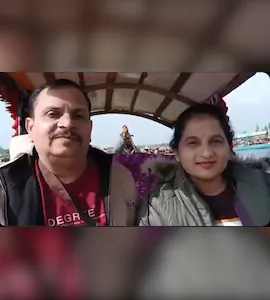The terrorist attack on tourists in Pahalgam, Jammu and Kashmir, on April 22, 2025, shocked the nation with its brutality and targeted violence. Among the survivors, Pallavi, a woman from Shivamogga, Karnataka, shared a chilling account of her face-to-face encounter with one of the attackers. Her testimony not only adds a human dimension to the tragedy but also highlights the intended political message behind the massacre.
The Attack and Pallavi’s Ordeal
Pallavi was visiting the scenic Baisaran Valley with her husband, Manjunath, and their 18-year-old son. As militants stormed the area and began firing at tourists, chaos and bloodshed unfolded rapidly. In the onslaught, Manjunath was fatally shot.
In a moment of desperation and anguish, Pallavi confronted one of the terrorists, pleading for her life to be ended as well. However, instead of responding with more violence, the militant uttered a shocking line:
“Nahin marenge. Tum Modi ko jaake bolo.”
(“I won’t kill you. Go and tell Modi.”)
These words sent a clear and disturbing message — the act was not just a random act of terror, but a calculated statement aimed at India’s leadership.
Targeted Nature of the Attack
Accounts from multiple survivors indicate that the militants specifically targeted non-Muslim male tourists. Witnesses reported that men were forced to prove their religious identity by reciting the Islamic kalma and undergoing physical checks. Those who failed were executed at close range.
Women and children were largely spared — not out of mercy, but seemingly to act as witnesses and messengers. Pallavi’s experience aligns with this pattern, indicating that the terrorists intended to incite fear, provoke communal tension, and directly challenge the Indian government.
The Resistance Front’s Role
The Resistance Front (TRF), a known proxy of the banned Pakistan-based militant group Lashkar-e-Taiba, claimed responsibility for the attack. The group justified its actions by citing opposition to the settlement of non-local populations in Jammu and Kashmir — a policy shift that has been promoted by the Indian government to encourage investment and tourism in the region.
By sparing certain individuals and issuing specific statements, the TRF sought to amplify its message across political and social channels, turning an act of terror into a form of psychological warfare.
National and International Reactions
The attack drew condemnation from leaders across India and around the world. Prime Minister Narendra Modi, while expressing grief over the loss of lives, vowed decisive action against those responsible. Home Minister Amit Shah echoed the sentiment, emphasizing that the government would not allow terrorism to derail peace and progress in Jammu and Kashmir.
From global quarters, leaders and human rights organizations condemned the targeting of civilians and expressed solidarity with the victims’ families. The incident has renewed calls for stronger international cooperation in combating terrorism.



